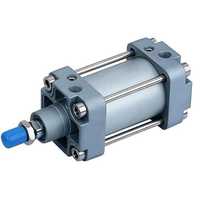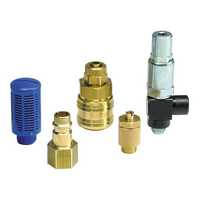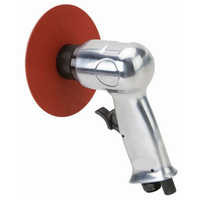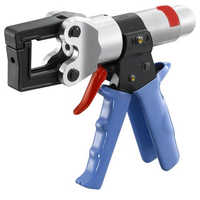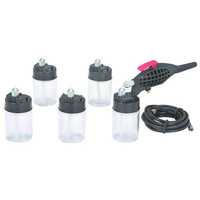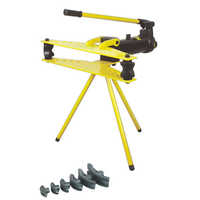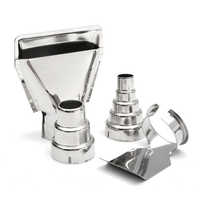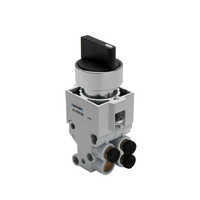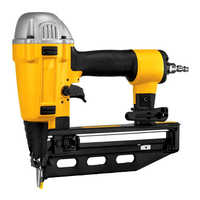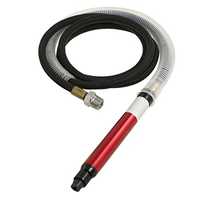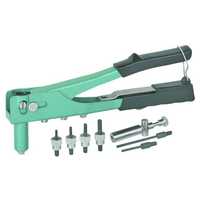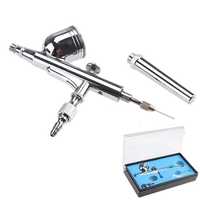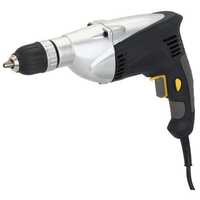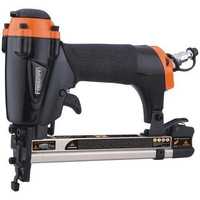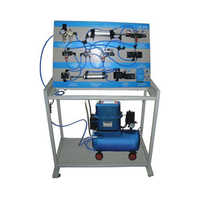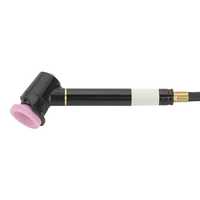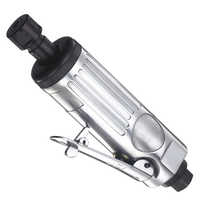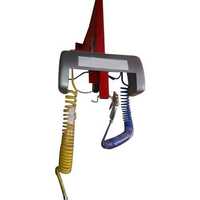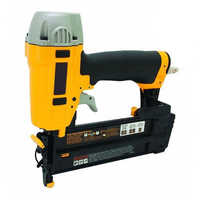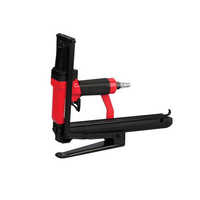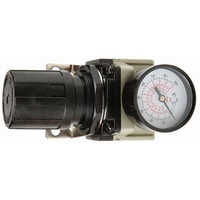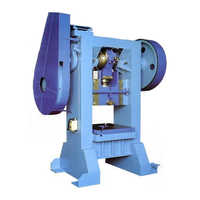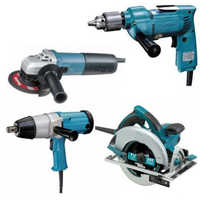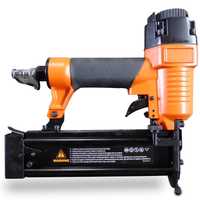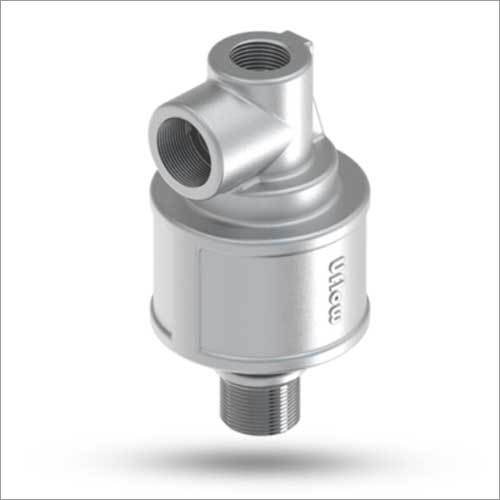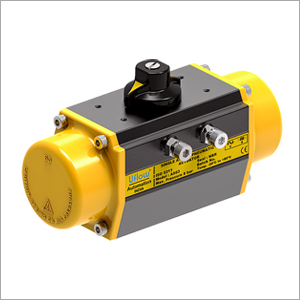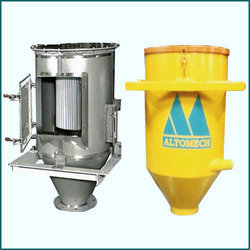Pneumatic Products & Tools
(4261 products)
Explore More Categories
Product Showcase
Pneumatic Actuator - Application: Compressed Air
Price: 2500 INR (Approx.)/Unit
MOQ - 100 Unit/Units
Size - 32MM TO 150MM
Color - Yellow
Usage - Industrial
5 Years
Response Rate: 86.67%
Business Type: Manufacturer | Exporter
UFLOW AUTOMATION
Black Mild Steel Bolt Tensioner Pump
Price: 335000 INR (Approx.)/Piece
MOQ - 1 Piece/Pieces
Usage - Industrial
Product Type - Mild Steel Bolt Tensioner Pump
Weight - 30-40 Kilograms (kg)
8 Years
Business Type: Manufacturer | Exporter
ASMI ENGINEERING
Made in India
Pneumatic Conveyors
11 Years
Business Type: Manufacturer | Exporter
ALTOMECH PRIVATE LTD.
Made in India
Ms And Ss Thermodynamic Steam Trap With Inbuilt Strainer
Price Trend: 1000.00 - 2500.00 INR (Approx.)/, Piece
MOQ - 1 , Piece/Pieces
Size - 1/2 Inch
Color - Silver
Material - MS and SS
14 Years
Business Type: Manufacturer | Distributor
FUTURISTIC TECHNOLOGIES
Indian Inquiries Only
Made in India
Electro Pneumatic Positioner - Color: Black
MOQ - 1 Piece/Pieces
Color - Black
Size - Standard
Product Type - Electro Pneumatic Positioner
13 Years
Business Type: Manufacturer | Distributor
VIRAL ENTERPRISE
Made in India
Bldb Pneumatic Products - Color: Black
Media - Water
Usage - Industrial
Color - Black
8 Years
Business Type: Manufacturer | Supplier
ASTEN CONTROLS LLP
Made in India
Mig Robot With Rotary, Phase: 3
12 Years
Business Type: Manufacturer | Distributor
SOLAR CNC AUTOMATION
Made in India
Oil Pulse Tool
Price Trend: 30000.00 - 200000.00 INR (Approx.)/Unit
MOQ - 01 Unit/Units
15 Years
Business Type: Manufacturer | Distributor
MODERN TRADERS
Made in India
Pneumatic Cylinders
6 Years
Business Type: Manufacturer | Exporter
JINDAL HYDRO PROJECTS INC.
Made in India
Pneumatic Gate
2 Years
Business Type: Manufacturer | Exporter
KRISHNA GRAIN SYSTEMS PVT. LTD.
Made in India
Silver High Flow Regulator
Price Trend: 5000.00 - 10000.00 INR (Approx.)/Piece
MOQ - 1 Piece/Pieces
Product Type - Regulator
Material - Stainless Steel
Valve Structure - Festo Type
15 Years
Business Type: Manufacturer | Exporter
DYNAMIC ENTERPRISES INC.
Black Pressure Cup Spray Gun
MOQ - 100 Piece/Pieces
Size - Different Available
Color - Black, Silver
Product Type - Pressure Cup Spray Gun
1 Years
Business Type: Manufacturer | Distributor
Wuerth India Pvt. Ltd.
Indian Inquiries Only
Made in India
Eco Ps8016 Pneumatic Stapler, Pressure: 50 - 90 psi
5 Years
Response Rate: 96.35%
Business Type: Manufacturer | Distributor
MANILAL PACKPLAST LLP
Made in India
H Frame Pneumatic Presses, Height: 5.5 Feet
10 Years
Business Type: Manufacturer | Exporter
VIVEK MACHINE TOOLS
Semi Automatic Pneumatic Strapping Tool
14 Years
Business Type: Manufacturer | Distributor
VIJAY ENTERPRISE
Made in India
Industrial Stripping Tools
18 Years
Business Type: Manufacturer | Exporter
LAKSHMI ELECTRO CONTROLS & AUTOMATION
Indian Inquiries Only
Made in India
Silver Pet Strapping Tool
Price: 22500 INR (Approx.)/Unit
MOQ - 5 Unit/Units
Product Type - PET Strapping Tool
Media - Air
Color - Silver
2 Years
Business Type: Manufacturer | Distributor
STRAPERA STRAPPING TECHNOLOGY
Made in India
Pneumatic Automatic Staplers Air Consumption: 5 - 8 Bar
Price: 950000.00 INR (Approx.)/Piece
MOQ - 1 Piece/Pieces
Air Consumption - 5 - 8 Bar
7 Years
Business Type: Manufacturer | Supplier
RUDANI ENTERPRISES PVT. LTD.
Made in India
Worm Drive SS 304 Hose Clamp
Price: 259 INR (Approx.)/Piece
MOQ - 1 Piece/Pieces
19 Years
Business Type: Manufacturer | Distributor
JAY AGENCIEZ
Made in India
Hydro Pneumatic Lockbolt Tool
Price Trend: 20000.00 - 100000.00 INR (Approx.)/Piece
MOQ - 1 Piece/Pieces
21 Years
Response Rate: 87.10%
Business Type: Manufacturer | Distributor
S.L Fasteners Private Limited
Pneumatic Handling Systems
4 Years
Business Type: Manufacturer | Exporter
RIECO INDUSTRIES LTD.
Made in India
Stainless Steel Pneumatic Machines
Price: 6550 INR (Approx.)/Piece
MOQ - 1 Piece/Pieces
Product Type - Pneumatic Machines
Media - Gas
Usage - Industrial
4 Years
Business Type: Manufacturer | Exporter
AIRCON PNEUMATICS
Made in India
Metal Pom Air Blow Gun
Price: 999 INR (Approx.)/Unit
MOQ - 1 Unit/Units
Product Type - Air Blow Gun
Usage - Industrial
Material - Metal
3 Years
Business Type: Trading Company
GURU MARKETING
Indian Inquiries Only
Safety Relief Valves - Color: Black & Golden
Price: 3000 INR (Approx.)/Piece
MOQ - 50 Piece/Pieces
Color - Black & Golden
Usage - Industrial
Size - 40 x 50 NB, 50 x 80 NB, 80 x 100 NB, 100 x 150 NB, 150 NB x 150 NB, 150 NB x 200 NB & 200 x 250 NB
6 Years
Business Type: Manufacturer | Supplier
MAHAVAS PRECISION CONTROLS PRIVATE LIMITED
Precise Dispenser - Color: Black
Price Trend: 180.00 - 195.00 USD ($) (Approx.)/Set
MOQ - 10 Set/Sets
Product Type - Precise Dispenser
Color - Black
Usage - Industrial
6 Years
Business Type: Manufacturer | Distributor
JO LONG MACHINE INDUSTRIAL CO., LTD.
Pneumatic Dust Collector
21 Years
Business Type: Manufacturer | Supplier
KAPS ENGINEERS
Made in India
Mild Steel Arm Type Air Tapping Machine, Functions: Tapping
6 Years
Business Type: Manufacturer | Exporter
PRATEEK INTERNATIONAL
Pneumatic Spreaders
15 Years
Business Type: Manufacturer | Exporter
TOUGH CASTING PRIVATE LIMITED
Pneumatic Products & Tools Manufacturers | Suppliers in India
| Company Name | Location | Member Since |
|---|---|---|
| S.L Fasteners Private Limited | Kundli, India | 21 Years |
| Kaps Engineers | Vadodara, India | 21 Years |
| Jay Agenciez | Surat, India | 19 Years |
| Lakshmi Electro Controls & Automation | Bengaluru, India | 18 Years |
| Modern Traders | Mumbai, India | 15 Years |
| Dynamic Enterprises Inc. | Pune, India | 15 Years |
| Tough Casting Private Limited | Kolhapur, India | 15 Years |
| Futuristic Technologies | Ahmedabad, India | 14 Years |
| Vijay Enterprise | Kolkata, India | 14 Years |
| Viral Enterprise | Valsad, India | 13 Years |
What Are the Tools Used in Pneumatic Products and Tools
The majority of people aren't familiar with pneumatic tools and equipment, despite the fact that they are used in a wide variety of significant innovations. The hand bellows were an early kind of air compressor and the earliest pneumatic tools. They were used by early blacksmiths and smelters for the purpose of working with iron and other metals. Because they are powered by compressed air, these instruments are sometimes commonly referred to as "air tools." Big air compressors provide the power for the tools that are used in large commercial environments and enormous industrial settings.
The whole of the compressor unit is equipped with a variety of outlets, which provide the possibility of connecting a wide range of equipment. To perform its intended purpose, every instrument needs a certain volume of air pressure. When it comes to the efficient operation of a tool, maintaining a steady amount of pressure is really necessary. As a result, these tools come with a tank attached to them. There are portable compressors that may be used to power these instruments so that they can continue to perform their functions effectively for a longer amount of time. Drills, grinders (equipment used for metalworking), sanders, ratchet wrenches, hammers, and pneumatic chip removal guns are a few examples of the types of instruments that fall under the category of pneumatic tools.
What are Pneumatic Products & Tools
Any of a wide variety of equipment and devices that create and use compressed air is referred to as a pneumatic device. Atomizers, blast cleaners, paint sprayers, forging presses, pavement breakers, riveters, and rock drills are some examples of machines that fall within this category. Power generated by compressed air is adaptable, cost-effective, and risk-free. A device that uses air does not provide a risk of sparking in an explosive environment, and it may be used in moist situations without posing a risk of electric shock. It is not necessary to install return connections since a very modest compressor is all that is required to fill a storage tank for occasional usage.
In order to fulfill certain service needs, it is necessary for a compressed-air system to possess a number of other qualities. It is not too difficult to link one piece of equipment to another piece of equipment using a pipe, flexible hose, or tubing. The straightforward turning of valves may have an influence on a wide variety of activities. A cylinder with an actuating piston allows for smooth, rapid, and almost shock-free motion adjustments. Controlling both speed and motion may be done with a great deal of freedom using an air system. In order to safeguard a system and keep it from being damaged, relief valves may be readily installed. The management of the operations is straightforward, effective, and centralized. In general, air systems have a very small number of moving components, which contributes to both their high level of dependability and their cheap cost of maintenance.
What is the difference between pneumatic products & tools?
Pneumatics is the name given to the subfield of mechanical engineering that studies the applications and tools that make use of pressurized gases or air. The driving forces that are used by these pneumatic tools, equipment, and systems are distinct from those that are utilized by their hydraulic and electrical equivalents. Pneumatic tools are those that deal with compressed air or gas, as opposed to hydraulic tools which work on electrical tools and pressurized liquids that use electricity. Pneumatic tools are used often in both home and commercial settings, and some of the more well-known examples are air rams, cylinders, grinders, nail guns, and screw guns. The simplicity of use and built-in safeguards that they provide are largely responsible for their widespread adoption. Because the stored air or gases possess potential energy that may be transformed into kinetic energy once they are compressed, it is possible for them to expand, which will cause the piston to move as a result. Pneumatic tools get their functionality from the tremendous force that is generated by pressurized gases. Let's talk about the different kinds of tools that function on the basis of air pressure and the mechanisms behind how they do so.
Air guns: Air guns are common and useful equipment for nailing and utilizing screws at rapid speeds, making them a popular choice for these applications. They have applications in the fields of carpentry, building construction, and woodworking. For rapid feeding of screws, pneumatic screw guns are the tool of choice. Be aware that the very first versions of nail guns relied entirely on the application of air pressure as their driving force.
Pneumatic cylinders: There are several variations of pneumatic cylinders to choose from. To mention only a few examples, there is the double-acting cylinder, the rodless air cylinder, the rotating air cylinder, and the single-acting cylinder. These pneumatic instruments are favored by a lot of people for a lot of different reasons. One advantage is that they are better for the environment. The second advantage is that they do not produce any noise and do away with the need of storing liquids while in operation.
Pneumatic sprayers: Paint may be applied to huge areas of a surface in a very short amount of time using pneumatic sprayers, which are tools. The mechanism behind their operation is comparable to that of pneumatic weapons.
Pneumatic actuators: such products are equipped with components such as pneumatic pistons, valves, and cylinders that may be put to work in a variety of applications, including those utilized in the chemical and oil refining industries.
What are the Advantages of Pneumatic Tools
Electric tools are useful in a variety of contexts, including professional settings as well as home workshops. Corded power tools aren't always the safest option, and thanks to developments in battery technology, cordless power tools are quickly becoming the go-to option in many situations. If you do not need the increased power and dependability that may be supplied by air tools, then you could find that the electric alternative is enough for your application. In professional settings, pneumatic or air tools are increasingly often used, particularly in manufacturing, as well as in auto and woodworking industries. The following is a list of the primary benefits that pneumatic tools have over electric ones:
1. Because they have fewer moving parts and are designed more simply, air tools are less expensive both to buy and maintain.
2. Because of its versatility, compressed air may serve as a source of power in a wide range of settings and in a wide number of applications. You may change equipment and jobs quickly with a reliable airline that is always available for fluctuations or a continuous supply over the long term. Compressed air can be kept for use in distant regions, and you can use it if you need to utilize it.
3. Maintenance: Because the tools themselves are made up of a very small number of components, they need relatively little in the way of maintenance or repair. Lubricating the air in the air system using aerosolizing lubricating oil helps the tool last longer due to less friction. Even though there isn't much that has to be done in the way of maintenance for electric equipment, repairs and even total failures of the tools are considerably more prevalent.
4. Security: Air tools usually operate cooler than electric tools, and they fully remove risks such as the possibility of fire and electric shock. In addition, they will never get overloaded or stall, both of which may result in a variety of potentially dangerous scenarios and deprive you of one of your tools.
5. Weight: In general, air tools have a greater rate of output than their manual counterparts owing to their lighter weight and decreased potential for worker fatigue. Electric tools often have a cumbersome design that incorporates the motor, and this design tends to become even more cumbersome as the tool's output power increases.
6. Pneumatic tools have a higher power-to-weight ratio than similar-sized cordless or electric equipment due to their greater torque levels and higher revolutions per minute (RPM).
FAQs: Pneumatic Products & Tools
Q. What are the tools used in pneumatic?
Ans. Grinders, chippers, drills, hammers, sanders, spray guns, air ratchets, and many more types of equipment are examples of pneumatic tools. Pneumatic tools are driven by compressed air.
Q. How many pneumatic tools are there?
Ans. There are plenty of pneumatic tools out there, too many to mention at once. Some of them are:
1. sanders and wrenches.
2. riveting guns
3. chipping hammers
4. jackhammersrs
5. drills
6. grinders
7. nailing and stapling guns
8. Buffers
Q. Where are pneumatics used?
Ans. In every manner of assembly and production processes, pneumatic systems are an essential component. They are able to be placed to move goods along production lines as well as in maintenance facilities where they are used to move items. Because pneumatics give a repeating motion, they may also be employed with heavy gear like drills. One example of this would be a pneumatic hammer amongst many more.
Q. What is called pneumatic?
Ans. The use of gas or pressured air is at the heart of the engineering discipline known as pneumatics.
Related Categories
Abrasives
Acoustic Products
Acrylic Sheets
Air Blowers
Air Compressors & Air Separation Plants
Air Cooler
Air Dryers
Air Receiver
Air Valves
Aluminum Castings
Anchors
Anti Vibration Mounts
Ball & Roller Bearings
Ball Valves
Ballast Making Machines
Bearing Parts & Components
Bearings
Bellows & Expansion Joints
Belt Pulleys
Boilers, Components & Spares
Bolts
Bright Bars
Bristles
Burners/Industrial Burners & Incinerators
Bushings & Bushing Parts
Butterfly Valves
CNC Machined Components
Cable Pulleys
Capital Goods
Carbon & Graphite Products
Castor Wheels
Centrifugal Pumps
Centrifuges
Ceramics
Chains & Chain Link Fence Fittings
Cleaning Equipment
Clips, Clamps
Coils
Combustion Equipment
Compression Springs
Compressors & Allied Equipment
Control Valves
Conveyor & Conveyor/Industrial Belts
Cooling Tower & Chilling Plants
Corrosion Protection Materials
Coupling
Cranes
Cryogenic Equipment
Cutting Tools, Broaches & Cutters
Departmental Shelving
Diaphragm Valves
Die Castings
Dies & Moulds
Dies,Jigs,Fixtures
Diesel Engine & Electric Locomotive Spares
Draught Fan
EOT Cranes
Electric Hoists
Electric Motors & Engines
Electroplating Chemicals & Equipment
Elevators, Lifts & Escalators
Energy Management System
Engine Valves
Engineering Goods & Equipment
Engineering Plastics
Engraving Equipment
Extruded Profiles
Fasteners
Fiberglass Products
Filter Cartridges & Media
Filter Cloth, Filter Industrial
Filters-Air, Gas, Liquid
Filtration & Sedimentation Units
Flat Metal Processing Equipment
Float Valves
Fork Lift Truck Parts
Fork Lift Trucks
Forklifts
Foundry Raw Material & Equipment
Furnace Manufacturers
Galvanized Fasteners
Gantry Cranes
Gaskets
Gate Valves
Gauges & Gauge Glasses
Gear Boxes, Reduction Gears & Gear Cutting
Girder Cranes
Glass & Glass Products
Glass Cutting Tools/Glass Cutters
Globe Valves
Goliath Cranes
Grating
Hand & Allied Tools
Hand Pump
Hardware & Tools
Heat Exchangers
Heating Elements
Hex Bolts
Hex Nuts
Hooks & Mounts
Hoses
Hot Air Oven
Humidification & Ventilation Equipment
Hydraulic Hoses & Flexible Metal
Hydraulic Press
Hydraulic Press Brakes
Hydraulic Products & Equipment
Hydraulic Valves
Induction Heating Equipment
Industrial Automation
Industrial Brakes
Industrial Brushes
Industrial Clothing
Industrial Clutches
Industrial Cylinders
Industrial Dryers
Industrial Evaporators
Industrial Knives
Industrial Nets
Industrial Ovens
Industrial Rollers
Industrial Supplies Stocks
Industrial Supplies-General
Industrial Tape
Industrial Tools
Industrial Valves
Industrial Vibrator
Inspection Equipment
Instrumentation
Internal Combustion Engine
Jib Cranes
Laboratory Furniture
Laboratory Glassware & Equipment
Laundry Equipment
Lined Valves
Machine Tools Accessories
Marking Systems
Material Handling Equipment
Measuring Tools & Equipment
Mechanical Seals
Metallised Capacitor Films
Mining Equipment
Mining, Exploration & Drilling Machinery
Model Making Materials
Motor Couplings
Moulded Components
Moulds
Needle Valves
Needles
Nuts
Oil Seals
Outdoor Cooling Systems
Overhead Cranes
PVC Hoses
PVC Products
Paint Brushes
Painting Equipments & Maintenance
Perforated Sheets
Plastic Processing Machinery Parts
Plastic Valves
Plastic Welding Equipment
Plate Valves
Plug Valves
Pneumatic Products & Tools
Pneumatic Valves
Polish & Polishing Material/Machinery
Power Press
Precision Brass Components
Pressed Components
Pressure Gauges
Pressure Vessels
Pulleys
Pulverizers
Pump Spares Parts
Pumps & Pumping Equipment
Radiators
Refrigeration & Equipment
Rope Pulleys
Rope,Twines & Webbings
Ropes
Rotary Valves
Rubber & Rubber Products
Rubber Gaskets
Rubber Roller
Rubber Seals
Rubber Transmission Belts
Screws
Seals
Sensors & Transducers
Shaft Couplings
Shafts & Shaft Collars
Sheet Metal Components & Parts
Solenoid Valves
Springs
Stainless Steel Bolts
Stainless Steel Fasteners
Stainless Steel Nuts
Stainless Steel Valves
Storage Systems
Storage Tanks
Submersible Pumps
Surface Finishing Equipment
Synthetic Industrial Diamonds
Testing & Measuring Equipment
Thermostatic Bimetals & Thermostats
Trolleys & Carts
Tungsten Carbide
Ultrasonic Equipment
V-Belts
Vacuum Equipment & System
Valves
Valves Fittings
Vibrating Screen
Washers
Water Coolers
Weighbridge
Welding & Soldering Supplies
Welding Electrodes
Welding Equipment
Winches
Wire Drawing Dies
Wire Rope Hoists
Wire Ropes
